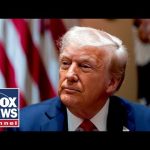The American economy is currently in a bit of a rollercoaster ride, with twists and turns that leave many business leaders scratching their heads. Recently, the White House touting a whopping $8 trillion in new U.S. investments added a new wrinkle to the ongoing conversation about tariffs. However, it seems someone may need to double-check their math because that large number was quickly corrected, and the focus shifted to more realistic projections of job creation and investment. This came at a time when a federal appeals court delivered a verdict declaring many of President Donald Trump’s tariffs illegal. Talk about a plot twist!
The updates from the White House stated that the economy is buzzing, with rising confidence among small businesses. They claimed that these investments would create hundreds of thousands of jobs and promote a resurgence in native-born jobs. While that sounds promising, the recent court ruling has stirred up uncertainty. Business leaders, whether big or small, are concerned about how legal battles over tariffs might impact their operations and the broader economy as they navigate these unpredictable waters.
Treasury Secretary Scott Bessent expressed that he believes the White House will ultimately win in the courts. His reasoning seems to be that it’s crucial to prevent potential financial instability stemming from trade deficits. It’s a well-known fact that uncertainty can lead to caution, and the last thing businesses want is to be caught off guard. With many unsure of how President Trump’s tariffs were imposed and whether they will remain valid, the question of constitutional authority over trade is brought to the forefront. It was noted that many folks might feel a bit uneasy as the discussion of taxes and tariffs shifts back to the courts and, possibly, the Supreme Court.
Bringing this back to ground level, many experts believe this all boils down to a simple challenge: what can the President legally do regarding tariffs? The conversation returned to how tariffs have caused disruptions not just in the United States but across the globe. While some economists point out that the trade deals struck during the Trump administration have been beneficial, they also caution that tariffs can generate uncertainty that may hinder growth. Cynical or confident, the markets are reflecting the mixed feelings that these legal challenges bring to the economic landscape.
Despite the uncertainties swirling about tariffs, some encouraging signs seem to suggest a silver lining. Reports indicate that household incomes have risen by around $1,000, which is certainly a positive data point amidst the murky waters of economic discussions. Moreover, falling gas prices leading up to Labor Day have given the White House something to cheer about. As midterm elections approach, reporters and pundits alike are keenly watching to see how these economic indicators will shape political consequences. Will the administration’s accomplishments quiet the critics, or will the ongoing legal battles over tariffs overshadow the gains? Only time will tell in this captivating economic saga.




